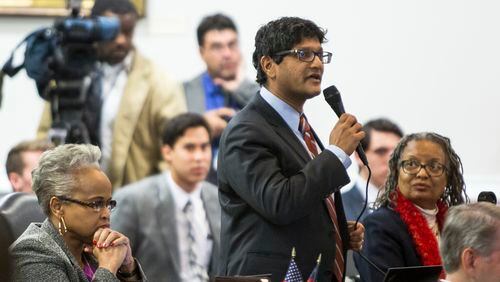North Carolina lawmakers on Wednesday adjourned a special session without taking action on the so-called “bathroom bill” that has roiled the Tar Heel State for the past year.
The state’s Legislature was expected to repeal House Bill 2 after the Charlotte City Council earlier Wednesday voted to repeal an anti-discrimination ordinance that led the GOP-dominated Legislature to adopt HB 2 in the first place.
For months, Republicans had said if Charlotte repealed its ordinance, the Legislature would consider repealing HB2.
North Carolina Republican Gov. Pat McCrory called Wednesday’s special session, but the deal fell apart when Republicans added a six-month moratorium on cities passing nondiscrimination ordinances for LGBT people. That caused Democrats to back away, calling it only a partial repeal.
“This wasn’t the deal,” said state Sen. Jeff Jackson, a Charlotte Democrat. “This bill breaks this deal. Charlotte would have not repealed its ordinance if this was the deal.”
So HB 2 remains the law in North Carolina, and its largest city is bereft of the civil rights protections its council members supported.
In Georgia, those on both sides of the debate over “religious liberty” legislation were closely watching North Carolina.
Jeff Graham, the executive director of Georgia Equality, a gay rights advocacy group, said North Carolina’s failure should be a “cautionary tale” for Georgia lawmakers.
“Not only did it backfire on the person who orchestrated all of this — Governor McCrory — but it has wasted taxpayer dollars in at least two special legislative sessions devoted to this topic,” Graham said. “On top of that, the damage to the state’s reputation, the boycotts, the lost revenue. Plus, what else has North Carolina been able to talk about the last nine months?”
In North Carolina, HB 2 is blamed for the loss of hundreds of jobs and millions of dollars in tourism. Major sports leagues moved tournaments and high-profile events from the state.
Wednesday’s development in Raleigh comes after lawmakers there earlier this month voted in a separate special session to strip incoming Democratic Gov. Roy Cooper of many powers. Cooper narrowly defeated McCrory, an outcome based, at least in part, on the incumbent’s support of HB 2.
Gov. Nathan Deal's decision in April to veto House Bill 757, a wide-ranging bill that supporters said would protect individuals' ability to practice their religion but that opponents said could codify discrimination, was based, in part, on what happened in North Carolina.
“It’s time to take another deep breath,” Deal said in April. “I see what’s happening in North Carolina. I see what’s happening in Mississippi. And I would hope that many of the ones that are pushing for it would not want the state of Georgia to go through that kind of scenario.”
Supporters of HB 757, including Lt. Gov. Casey Cagle and House Speaker David Ralston, R-Blue Ridge, expressed disappointment with Deal's action, but no serious effort to override his veto is expected when Georgia lawmakers return to session in January.
That does not mean, however, that attempts won't be made to pass a similar bill here in 2017. State Sen. Josh McKoon, R-Columbus, a key supporter and sponsor of similar bills in past years, said he has not yet decided whether to introduce his own version or to sign on to a colleague's bill.
McKoon previously has questioned what has become conventional wisdom about the impact of these types of bills.
The media, McKoon said in September, has sensationalized fallout in North Carolina, including decisions by the National Basketball Association, the National Collegiate Athletic Association and the Atlantic Coast Conference to move marquee events from the state because of its HB 2, which bars transgender people from using public bathrooms for the sex they identify as.
He and others note job gains in Florida, Texas and other states with “religious liberty” statutes in the books.
“I think it’s absurd to suggest anyone is making a multimillion-dollar decision based on Deal vetoing an innocuous piece of legislation,” McKoon said.







